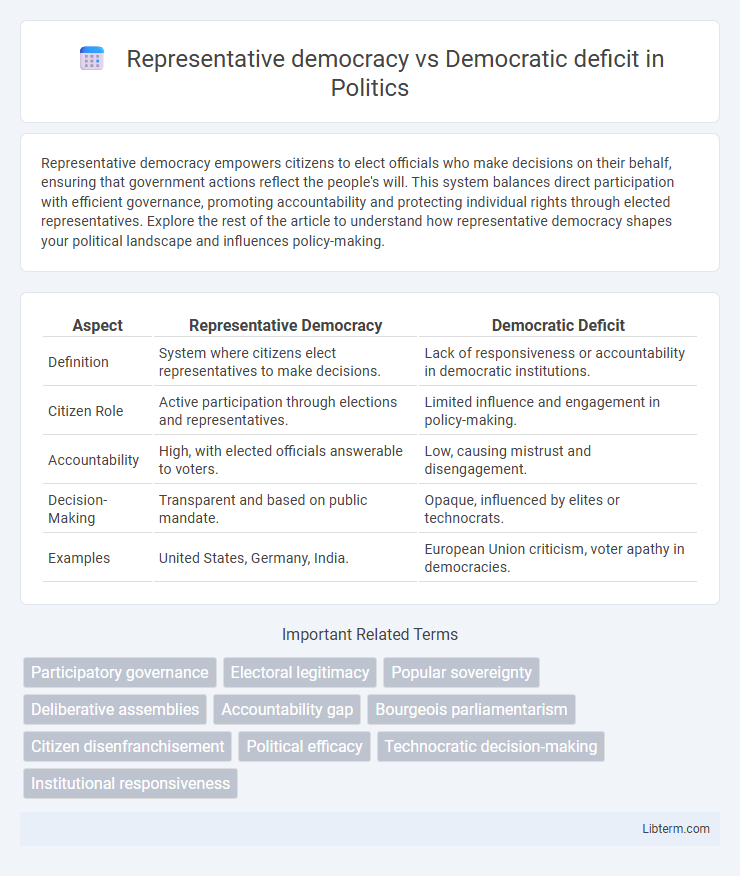Representative democracy empowers citizens to elect officials who make decisions on their behalf, ensuring that government actions reflect the people's will. This system balances direct participation with efficient governance, promoting accountability and protecting individual rights through elected representatives. Explore the rest of the article to understand how representative democracy shapes your political landscape and influences policy-making.
Table of Comparison
| Aspect | Representative Democracy | Democratic Deficit |
|---|---|---|
| Definition | System where citizens elect representatives to make decisions. | Lack of responsiveness or accountability in democratic institutions. |
| Citizen Role | Active participation through elections and representatives. | Limited influence and engagement in policy-making. |
| Accountability | High, with elected officials answerable to voters. | Low, causing mistrust and disengagement. |
| Decision-Making | Transparent and based on public mandate. | Opaque, influenced by elites or technocrats. |
| Examples | United States, Germany, India. | European Union criticism, voter apathy in democracies. |
Understanding Representative Democracy
Representative democracy enables citizens to elect officials who make decisions on their behalf, ensuring governance reflects the electorate's preferences while managing complex policymaking efficiently. Challenges arise when elected representatives fail to adequately communicate or act in the public interest, potentially leading to a democratic deficit characterized by decreased voter trust and political disengagement. Understanding the balance between effective representation and citizen participation is crucial for addressing democratic deficits and enhancing government accountability.
Defining Democratic Deficit
Democratic deficit refers to the perceived gap between the principles of representative democracy and the actual functioning of political institutions, where citizens feel their influence over decision-making is limited. This deficit manifests when elected officials or institutions do not adequately represent public interests, resulting in reduced accountability and transparency. Understanding democratic deficit is crucial to evaluating the legitimacy and effectiveness of representative systems in upholding democratic values.
Historical Origins of Representative Democracy
Representative democracy emerged from the historical evolution of political systems in Ancient Rome and medieval Europe, where elected officials acted on behalf of citizens in decision-making processes. The concept was further refined during the Enlightenment, emphasizing popular sovereignty and the separation of powers as foundational principles. Persistent concerns about democratic deficit stem from the gap between electoral representation and effective political participation, highlighting challenges in accountability and transparency within modern representative democracies.
Causes of Democratic Deficit
Representative democracy often faces democratic deficit due to factors such as limited political participation, lack of transparency, and inadequate accountability of elected officials. Structural issues like centralized power, electoral system flaws, and insufficient citizen engagement contribute significantly to the erosion of democratic legitimacy. These causes create a gap between public expectations and the actual performance of democratic institutions.
Representation vs. Participation
Representative democracy emphasizes elected officials acting on behalf of their constituents, prioritizing efficient decision-making and accountability through institutional mechanisms. Democratic deficit arises when citizens perceive their participation as limited, leading to disengagement and reduced influence over political outcomes. Balancing representation with active public participation is crucial to enhance legitimacy and responsiveness in modern governance systems.
Impact on Political Legitimacy
Representative democracy enhances political legitimacy by allowing elected officials to make decisions on behalf of citizens, fostering accountability and public trust. However, democratic deficit arises when there is a gap between public preferences and political actions, undermining legitimacy and citizen engagement. This discrepancy often leads to decreased voter turnout and skepticism towards institutions, weakening the foundation of democratic governance.
Electoral Systems and Their Role
Electoral systems in representative democracies critically shape political accountability and citizen participation, directly influencing the presence or absence of a democratic deficit. Proportional representation systems often reduce democratic deficits by ensuring diverse political voices in legislatures, whereas majoritarian systems can marginalize minority groups, exacerbating the deficit. The choice of electoral formula, district magnitude, and vote-to-seat translation determines representativeness and government legitimacy, key factors in addressing democratic deficits.
Mitigating Democratic Deficit in Modern Governance
Mitigating democratic deficit in modern governance involves enhancing transparency, accountability, and citizen participation within representative democracy frameworks. Mechanisms such as participatory budgeting, digital platforms for public consultation, and stronger oversight institutions improve responsiveness and reduce the gap between elected officials and constituents. Empirical studies show that integrating direct engagement tools and reforming electoral systems can significantly restore public trust and legitimacy in democratic institutions.
Case Studies: Examples from Around the World
Representative democracy often faces challenges related to democratic deficit, where elected officials fail to fully represent the electorate's preferences or needs. Case studies from countries like Italy reveal how coalition governments can lead to voter dissatisfaction and perceived lack of accountability, while in Venezuela, authoritarian tendencies within a representative framework exacerbate the gap between government actions and citizen demands. In contrast, Scandinavian countries such as Sweden showcase how transparent electoral systems and inclusive policymaking reduce democratic deficits and strengthen public trust in representatives.
Future Prospects for Representative Democracy
Representative democracy faces challenges from democratic deficit characterized by voter disengagement and limited political accountability. Emerging technologies like digital voting platforms and increased civic education efforts promise to enhance citizen participation and transparency. Future prospects hinge on integrating these innovations to bridge the gap between representatives and constituents, reinforcing trust and democratic legitimacy.
Representative democracy Infographic

 libterm.com
libterm.com